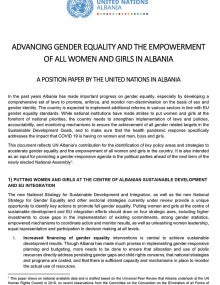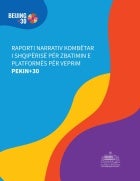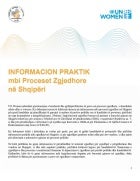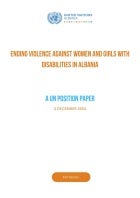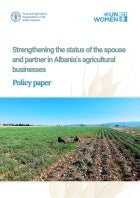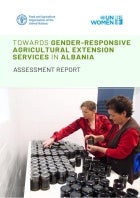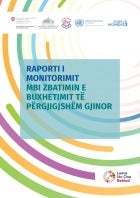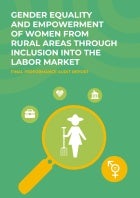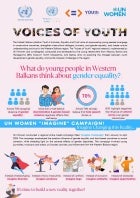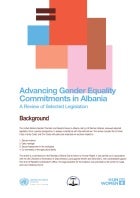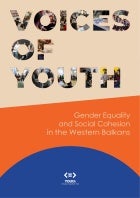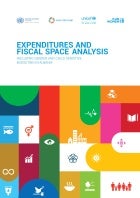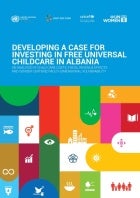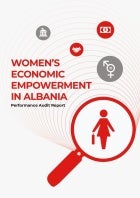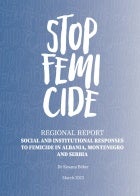Date:
Albania's national report on the implementation of the Beijing Declaration and Platform for Action (2019-2024). In addition to achievements and challenges, the report includes the country's priority for the next 5 years. The reporting process was led by the Ministry of Health and Social Protection, with the technical support of UN Women.
Date:
This document is a valuable resource for all potential candidates, not just women. It offers practical information on elections in Albania, both central and local, and provides tools to address gender inequalities in political processes.
Date:
This is the first report on the killings of women and girls, as well as femicide in Albania (2021-2023). The report, carried out under the Femicides Observatory within the People’s Advocate, serves as a vital monitoring mechanism to prevent femicide.
Date:
In Albania, women and girls with disabilities face stigma and social isolation due to deeply rooted cultural norms. The UN’s November 2024 Flagship Report on Disability and Development calls for accessible services, better data collection, and inclusive policies.
Date:
This policy paper highlights best practices from Belgium, France, and Spain, offering valuable insights for Albania as it advances toward EU accession and gender equality, with the aim of promoting women's rights and boosting economic opportunities in agriculture.
Date:
The Action Plan aims to bridge the gap between government and civil society, regional and local policies, and key development and human rights issues.
Date:
Since the launch of UN Women’s strategic note for Albania (2022–2026), UN Women Albania has made significant strides in enhancing its reach and impact across the nation.
Date:
This document presents the findings of a qualitative study that assessed the extent, progress and challenges of providing gender-responsive agricultural extension services in Albania.
Date:
PRISMA Network in Albania, the leading participatory budgeting network produced five Watchdog Reports focusing on “Inclusive social services for women and girls" in five municipalities: Fushe Arrez, Vau i Dejes, Gjirokastra, Dropull, and Delvine. These reports address specific issues relevant to the priorities and needs of each municipality as well identify preliminary challenges and strategies for improvement.
Date:
This audit report aims to evaluate the policies and their effectiveness in delivering quality services to promote the employment of women in rural areas.
Date:
Ky manual është një burim praktik për deputetët me qëllim ofrimin e mbështetjes dhe kontribuimin në zbatimin e Buxhetimin të Përgjigjshëm Gjinor (PBGJ) në të gjithë ciklin e menaxhimit buxhetor. Manuali bazohet në analizën dhe integrimin e BPGJ në të gjithë ciklin buxhetor. Ai përmban udhëzime hap pas hapi të nevojshme për t’u ndjekur nga deputetët, raste studimore dhe praktika pozitive premtuese për arritjen e BPGJ në procesin buxhetor.
Date:
UN Women conducted a regional online media campaign from February to April 2024. The campaign emphasized the positive influence of gender equality and fact-based narratives on social cohesion, while shedding light on the adverse effects of gender disparities. This campaign involved young journalists, musicians and artists, civil society activists, and influencers from the Western Balkans region.
Date:
This insightful document provide a comprehensive overview and assessment of gender equality in and through sports in Albania and offer concrete guidance to advance gender equality in sports, based on best practices and good examples from countries in Europe.
Date:
The United Nations Gender Thematic and Results Group in Albania, led by UN Women Albania, reviewed selected legislation from a gender equality perspective, to assess compliance with international legal standards, including EU gender aquis.
Date:
This regional research, implemented by UN Women and co-designed, conducted and developed by five young researchers from Albania, Bosnia and Herzegovina, Kosovo1 , North Macedonia, and Serbia aims to explore the linkages between youth development, gender equality, and social cohesion challenges in the region.
Date:
This Guidance Notes series provides succinct information on the key gender issues in selected policy areas, and to show how gender mainstreaming can be done in practical terms. This set of tools is made available through the EU’s and UN Women’s technical support to the Government of Albania in the context of accelerating the process of EU integration.
Date:
This analysis aims to shed light on the scope of gender responsive fiscal policies to address gender and child sensitive socio-economic vulnerabilities. This report analyzes the selected gender-sensitive fiscal policy and the mechanisms through which the policies affect social protection systems including women labor force participation, wage gaps, GDP growth, public fiscal balances, income distribution, and poverty.
Date:
The study provides concrete evidence on how gender sensitive public investment has important ramifications in terms of who benefits from child care and job creation. Beyond “who” benefits, the report also presents a comparative analysis of “how much and what kind of” benefits can be expected from each additional dollar gender-sensitive public spending versus gender-blind spending in universal child care.
Date:
The Supreme State Audit Institution in Albania has conducted a performance audit on the “Economic Empowerment of Women”, in the framework of the “Transformative Financing for Gender Equality Towards More Transparent, Inclusive and Accountable Governance in the Western Balkans” project, financed by the Government of Sweden – SIDA, with the technical support of UN Women Albania.
Date:
The regional report “Social and institutional responses to femicide in Albania, Montenegro and Serbia” was developed by FemPlatz with the technical support of UN Women in the framework of the regional programme on ending violence against women in the Western Balkans and Türkiye “Implementing Norms, Changing Minds,” funded by the European Union. The report – the result of three years’ work to develop a framework for understanding the characteristics, patterns, and causes of femicide – is the first interdisciplinary research on the societal and institutional response to femicide in Albania, Montenegro and Serbia.
